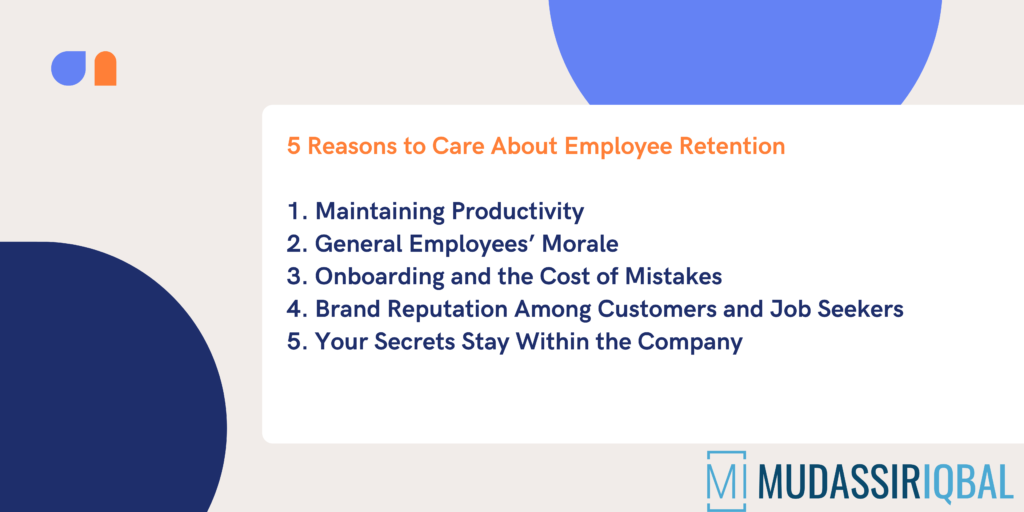
Some experts believe that staff turnover is an opportunity to renew the team, get fresh ideas and new professionals. Others, on the contrary, insist that every manager should address the problem of frequent staff resignations. In this case, we are talking about losing both experienced workers and those who quit their jobs every three months.
After all, the company spends resources on finding a candidate, his onboarding, and introducing him to the work processes. You know how hard it is to find a rare professional or, for example, manage the process of hiring salesforce developers. And if the key team lead decides to leave, it will be a severe blow for the company.
They are the workers you can rely on, entrust tasks with short deadlines, and delegate the most challenging responsibilities. It is why retaining an employee is a priority for some heads of organizations. In this post, we will outline the pitfalls of staff turnover and how to control it.
5 Reasons to Care About Employee Retention

1. Maintaining Productivity
If your company builds the right employee retention strategy, your workers won’t be tempted to leave you. The first signs of burnout may be a decline in productivity or frequent time off.
Chances are if subordinates often need to take a day off, they may be spending that time going on job interviews. During their absence, either other colleagues have to perform their tasks or they’re put on hold. Because of this, the efficiency of the department and the entire company suffers.
If a specialist leaves, the candidate search begins. At this time, someone also needs to fulfill their duties. Sometimes such substitutes can’t immediately perform additional responsibilities at a high-quality level. It happens that the amount of extra workload is disproportionate to payment, which reduces staff motivation.
With the arrival of a new person, you need to spend about three months on training to deliver the company’s principles and finalizing on responsibilities. You would be lucky to find the same or even more experienced specialist to replace the previous one. But if you hire someone with no experience, it may even take a year to return to the same level of productivity.
2. General Employees’ Morale
Let’s say a key worker has left the company. He had colleagues and subordinates in the department. And they managed to establish good relations. The absence of this person can reduce staff morale. Some will decide to leave after their leader. Those who stay will take time to get used to a new manager or a new colleague.
A new employee may have a different character, habits, principles of work. As a result, misunderstandings and conflicts can arise.
There are even special personality tests that HR managers ask candidates to pass. Such tests help understand:
- Will the future worker compromise?
- Is he open to new ideas?
- Is he an analyst or an actor?
Accordingly, each position requires certain qualities. And if you know about them in advance, you can facilitate the adaptation process.
Another problem is that other colleagues will see instability in the team. And they might also start looking for new jobs. It’s even worse if a valuable specialist quits in the footsteps of their colleague who has left. It decreases loyalty to the management and the organization as a whole.
3. Onboarding and the Cost of Mistakes
Searching for a candidate is a lengthy process. You need to check hundreds of resumes, conduct dozens of interviews, consider the company’s and the candidate’s requirements. After successful hiring, the challenges don’t end.
Every organization spends time and money on training new workers. If the employee leaves after the trial period, the organization will be at a complete loss. Searching for a candidate starts anew, which also doesn’t guarantee success in the end.
Mistakes are a natural part of the job. A beginner won’t immediately show good results. They need time to adapt to a new place and an unfamiliar team. Due to inexperience and novelty, the number of errors increases, and it leads to additional losses.
After losing an experienced specialist, the quality of service decreases. As I said above, a new worker may need training. Some positions require practical experience. Therefore, many companies are hiring people with a view to the future. They start from lower roles, learn, and only then get more responsible jobs.
4. Brand Reputation Among Customers and Job Seekers
Some clients get used to a company’s representative. It builds their loyalty. Losing a trusted agent can reduce their satisfaction as they will have less confidence in a new one. It is essential in B2B or banking, where customers’ trust is a backbone of a business.
Everyone understands that quitting is a natural process. People can retire, take maternity leaves, pursue their career paths. But it shouldn’t be the norm in your company.
It can give a false signal that you are a bad leader, can’t form a tight-knit team with values, or aren’t interested in improvement. Instead, business owners should ensure that customers have maximum confidence in their firm, so subordinates should have no reason to leave.
The search for talents runs on the same principle. Many job seekers pay attention to company turnover. If people quit this position every six months, it raises some questions.
There are professions where staff changes frequently. These are often students who receive a degree and find work in their field after a year or two. However, a high turnover in leadership positions can put off experienced job seekers.
5. Your Secrets Stay Within the Company
When a specialist quits, the risk increases that he will carry away business secrets. For example, a person worked in the sales department. Most likely, he will leave for a similar position to your competitors. You become vulnerable because he can take the customer base with him.
It doesn’t mean you will lose all the company’s clients. Typically, it involves just a part of your customers. But even in this case, it hurts the company for a long time ahead. The more loyalty the client showed to your representative, the more potential profit you lose.
To keep sensitive information secret, conclude a nondisclosure agreement with your workers. This way, you can outline the conditions and principles according to which you will exchange confidential information.
How to Tackle Employee Retention Issue
Why do your employees leave you? One of the reasons why this can happen is unfavourable working conditions. Here is what a manager can do to retain their employees:
1. Monitor the mood in the team and take into account the proposals of your subordinates. Workers need to realize that they have a voice and are appreciated for their contributions.
2. Ideally, the employee should love the job not only because it brings money, but also for something else. I.e., that there you can express yourself, grow professionally, unite according to interests, etc.
3. A person may be uncomfortable working in an office. It can be crowded or noisy there. Therefore, you can offer them to work remotely to increase their efficiency.
4. Motivate the employee to learn, offer company-sponsored courses or business trips to various events.
5. Don’t let your employees burn out. It may be worth transferring them to another department and suggesting other tasks if they are tired of doing the same thing.
6. Evaluate the employees’ performance and strengthen their self-esteem with praise. However, if you notice that they’re abusing the decision to leave and their performance is poor, it may be wise to let them go.
Summing Up
Any organization needs to maintain a healthy climate in the team so that people don’t want to leave. After all, only if the staff are happy with their salary, work conditions, workload, etc, they will be loyal and work with total dedication. They won’t look back at competitors and monitor vacancies, reducing their own and the entire company’s productivity. Therefore, managers need to think about retaining their employees.


